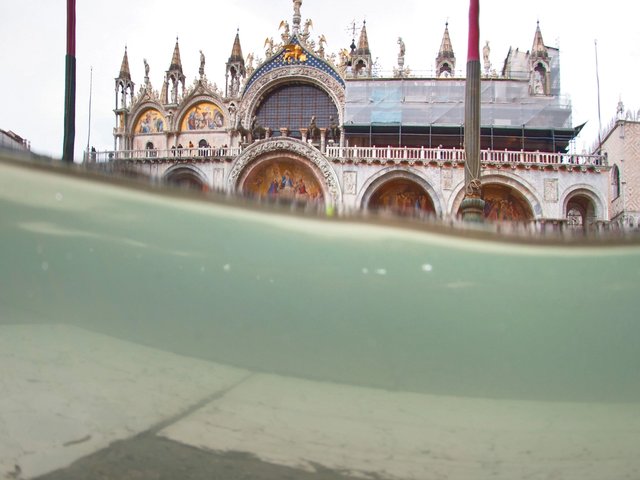Venice
“Why not give Venice special status, like that of the Vatican?” Italians have been stung by this recent suggestion of the French magazine Le Point, which, after a long catalogue of the country’s sins of omission and commission against the world’s loveliest and most fragile city, proposes that it might be better removed from the responsibility of Italy.
It was, however, an Italian, the European Community’s Commissioner for the Environment, Carlo Ripa de Meana, who first made the suggestion that Venice be entrusted to someone other than the Italians.
At a meeting of Private Committees concerned with the preservation of the city (the British Venice in Peril, the American Save Venice etc), held 19 October last, Ripa de Meana proposed that Venice should be placed under the administration of the European Community, grouping all present conservation and policy initiatives under an “Integrated Plan for Venice”, to be subject to EC procedures and controls. He said: “Considering the bitterness aroused everywhere by the Venice situation over the last twenty-five years, where the city has been held hostage by Italian political games where money is inadequate, the State should turn to the EC. The EC would be able to set up an administrative solution and the necessary financial means. All European Community and other interventions would be grouped under a Masterplan for Venice, and, with the agreement of the Italian government, subordinated to EC control. None of this could happen, obviously, unless Italy explicitly requested it from the EC. I hope that Italy will not suddenly suffer from an unfortunate fit of amour-propre”.
The chances of success for the Commissioner’s proposal seem slight. “No foreign doge”, was one headline which summed up the general feeling of outrage. The editor of the Venetian newspaper, Il Gazzettino, wrote that it was not reasonable for the few remaining citizens of a town which is being rapidly depopulated to sell what remains of its identity to the new bureaucracies of Brussels and Strasbourg, “said to be the most parasitical and obstructionist in Europe”. “If Venice is not saved as part of its own territories, no one will manage to save it”, he says, and it will become a city “without a language, without citizens, a Babel of glitterati, something between Montecarlo and Disneyland”.
However, many of the reactions acknowledge the shamefulness of the way the city has been treated by those in power in Italy (see the article on p. 12 by the Chairman of the Private Committees, Alvise Zorzi). The Socialist Deputy Mayor of Venice, Fulgenzio Livieri, believes that the city has no need of a higher authority put over it, but of ordinary laws, carefully put into practice; in other words, that those actually in power should do their duty.
The charges against Italy
• In 1970 a four-point agreement was signed between Unesco and the Italian government proposing:
1. That Italy confer on Venice a special status appropriate to the city’s needs.
Result: no special status was ever conferred.
2. That the application of this status be entrusted to a senior authority.
Result: the nomination of such an authority did not take place because it was thought to be undemocratic.
3. That the special status and the backup to it be financed in its initial stages by an international loan of $500 million, guaranteed by the Italian state.
Result: the loan was received by the Italian government but passed on very slowly to the city itself between 1973 and 1984, leading to speculation that the money was used instead to prop up the lira.
4. That the above proposals be overseen by a consultative committee of twenty: ten Italians nominated by the government and ten non-Italians nominated by Unesco.
Result: the Italian Minister for Foreign Affairs convened the committee three or four times, then allowed it to lapse.
• A number of financial initiatives have attempted to release funds: in 1973 and 1984 two laws were passed to unblock L300 billion and L1,850 billion respectively. In 1988 the more substantial sum of L16,5 billion was offered under a ten-year government plan to be shared between:
a. “Venezia Nuova”, a consortium formed from private and public companies to design and build a flood protection structure. Known as MOSE (Modulo Sperimentale Elettromeccanico), the prototype was unveiled in 1988 and is still arousing mixed reactions because of environmental worries.
b. The Veneto region, which would be responsible for cleaning the lagoon of its pollution.
c. The city, charged with the care of its monuments and the maintenance of the canals.
Result: the government simply did not have sufficient funds and the project was halted despite a personal appeal by the Christian-Democrat mayor of Venice, Ugo Bergamo, to Andreotti. Bergamo’s trip to Rome only resulted in the promise of L750 billion and a Senate amendment which would make L2000 billion (£935.45 million; $1.6 billion) available at a future time.
• In1989, Pink Floyd was invited to give a concert on the lagoon next to St Mark’s Square, which attracted 200,000 visitors and left a trail of damage and filth so awful the army had to be called in to clear it up.
• Gianni De Michelis, the Socialist Foreign Minister, almost succeeded in his pet project to get Venice and the Veneto selected as the sites of Expo 2000, the world fair, which would have flooded the city with people and brought into being numerous highly questionable building developments.


